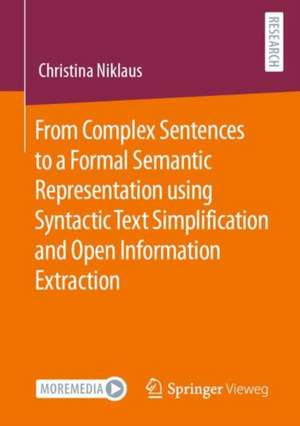From Complex Sentences to a Formal Semantic Representation using Syntactic Text Simplification and Open Information Extraction
Autor Christina Niklausen Limba Engleză Paperback – 30 aug 2022
Preț: 390.46 lei
Nou
Puncte Express: 586
Preț estimativ în valută:
74.74€ • 81.21$ • 62.82£
74.74€ • 81.21$ • 62.82£
Carte tipărită la comandă
Livrare economică 22 aprilie-06 mai
Preluare comenzi: 021 569.72.76
Specificații
ISBN-13: 9783658386962
ISBN-10: 3658386967
Pagini: 318
Ilustrații: XLI, 318 p. 106 illus., 58 illus. in color.
Dimensiuni: 148 x 210 mm
Greutate: 0.47 kg
Ediția:1st ed. 2022
Editura: Springer Fachmedien Wiesbaden
Colecția Springer Vieweg
Locul publicării:Wiesbaden, Germany
ISBN-10: 3658386967
Pagini: 318
Ilustrații: XLI, 318 p. 106 illus., 58 illus. in color.
Dimensiuni: 148 x 210 mm
Greutate: 0.47 kg
Ediția:1st ed. 2022
Editura: Springer Fachmedien Wiesbaden
Colecția Springer Vieweg
Locul publicării:Wiesbaden, Germany
Cuprins
Background.- Discourse-Aware Sentence Splitting.- Open Information Extraction.- Evaluation.- Conclusion.
Notă biografică
About the author
Christina Niklaus is an Assistant Professor in Computer Science at the University of St.Gallen with a focus on Data Science and NLP.
Textul de pe ultima copertă
This work presents a discourse-aware Text Simplification approach that splits and rephrases complex English sentences within the semantic context in which they occur. Based on a linguistically grounded transformation stage, complex sentences are transformed into shorter utterances with a simple canonical structure that can be easily analyzed by downstream applications. To avoid breaking down the input into a disjointed sequence of statements that is difficult to interpret, the author incorporates the semantic context between the split propositions in the form of hierarchical structures and semantic relationships, thus generating a novel representation of complex assertions that puts a semantic layer on top of the simplified sentences. In a second step, she leverages the semantic hierarchy of minimal propositions to improve the performance of Open IE frameworks. She shows that such systems benefit in two dimensions. First, the canonical structure of the simplified sentences facilitates the extraction of relational tuples, leading to an improved precision and recall of the extracted relations. Second, the semantic hierarchy can be leveraged to enrich the output of existing Open IE approaches with additional meta-information, resulting in a novel lightweight semantic representation for complex text data in the form of normalized and context-preserving relational tuples.
Christina Niklaus is an Assistant Professor in Computer Science at the University of St.Gallen with a focus on Data Science and NLP.
